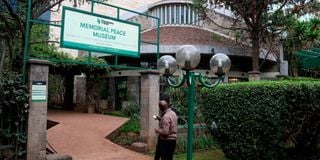Premium
August 7 Memorial Park: An oasis of peace

Memorial Peace Museum at the August 7 Memorial Park on the Moi-Haile Sellasie Avenue roundabout in Nairobi on August 3.
What was 24 years ago a scene of carnage and a pile of bodies and rubble has transformed into a tranquil park in the hustle and bustle of Nairobi.
The August 7 Memorial Park sits at the US embassy bombing site. It was built in honour of those killed or injured in the August 1998 events in Nairobi and Dar es Salaam, Tanzania.
The half an acre where the former embassy stood – with Ufundi Co-operative House next to it – is now the park that was officially opened on August 7, 2001.
It tells tales of lives lost and preserves memories of those scarred forever. But the park also serves as proof of resilience.
Situated on the junction of Haile Selassie and Moi avenues, the memorial park features paraphernalia left or picked from the scene of the tragedy on the fateful day, a fountain, benches, lawns and indigenous trees.
It also has a carving made from the metal and chunks of concrete left behind after the explosion.
Where the entrance of the park stands, was the gate to the American embassy.
The park has Wi-Fi and is frequented by university and college students working on their projects.

Faith Mutinda, daughter of 1998 bomb blast victim Daniel Mutinda, is pictured at the August 7th Memorial Park in Nairobi on August 7, 2019.
Flocked by people from all walks of life, the park serves as a meeting place or point of reference for direction in the city centre.
Several groups were using the memorial park’s boardroom for meetings while others at the garden were either studying in groups or seated alone on the day the Sunday Nation team visited.
“Like what appears on its website, this place is an oasis of peace in a concrete jungle,” said Kevin Omollo, a student who was working on his assignment.
Having emerged from a tragedy, the August 7 Memorial Park stands as a symbol of peace and optimism in our contemporary world many challenges.
The Memorial Peace Museum was designed for the visitors’ to honour those who lost their lives and tell stories of the August 7, 1998 bombing survivors.
It also tells stories of those whose lives were changed forever.
The magnitude of the anguish became palpable that morning when the smog settled after the explosion.
The Nairobi bombing claimed 213 lives – some 207 being Kenyans. It altered thousands of lives.
On November 4, 1998, Osama bin Laden and several members of his outfit were fingered by US security agencies for the bombing.
Bin Laden was killed by American special forces in Abbottabad, Pakistan, on May 2, 2011.
Survivors, victims and families of those who died visit the park every August 7.
Unlike other days, entry is free for everyone on this day.
Margaret Achieng Jow Prays during the 20th anniversary of the August 7, 1998 bombing of the US Embassy in Nairobi, at the August 7th Memorial Park in Nairobi on August 7, 2018.
Says August 7 Memorial Park’s General Manager Natasha Nyambura Mbugguss: “During anniversaries, the survivors association, comprising victims, the survivors themselves and their families, come together.”
The park provides them with the space.
“The images and exhibits are meant to educate the public on the consequences of terrorism and sensitise visitors on the need for peace, tolerance and reconciliation,” she said.
“We support the association with flowers, snacks, candles and any other thing members may need.”
The management of the park hopes to get more funding for bigger events like the 25th commemoration next year.
She describes heading the park as a rollercoaster of emotions.
“There is the tragedy aspect of it but what led to the creation of park makes it fulfilling. That gives us the energy to come here every day,” she said.
“On one hand you’re dealing with grief and bitterness, having to meet the families, victims and survivors. They have not forgotten what happened on that day.”
She says the events of the day are still fresh in the minds of many Kenyans even after all these years.”
“It is difficult but it’s also fulfilling. Out of tragedy came this beautiful oasis that is open to children, youth women and all. When I have a bad day, I walk to the garden and look at the lives we are changing,” she said.
Mr George Apiyo was in Nairobi on the Friday of the tragedy.
Mr Apiyo always visits the August 7 Memorial Park whenever he is in Nairobi.
“I would have died too. I passed by the gates of the US embassy just minutes before the explosion,” he recalled.
Near the gate, a high-traffic area, are concrete seats.
The slabs are not comfortable. Then there is the hot sun and the cold. Street children and families are forever begging from those seated.
Ms Mbugguss says the concrete seats were made by the firm contracted by the Nairobi Metropolitan Services to rehabilitate the area around Haile Selassie-Moi Avenue roundabout.
The rehabilitation has been going on for four months.
“They created a public area for sitting. We objected to the idea to no avail,” she said.
“Essentially, it is another park outside August 7 Memorial Park. Fortunately, people are still coming here though the numbers have fallen.”





